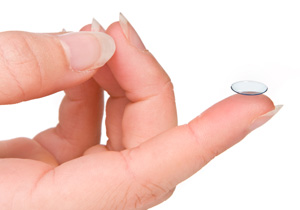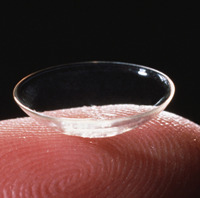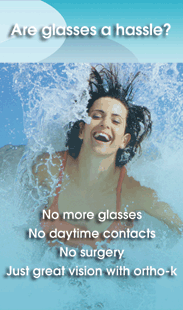Contact lenses need to be fitted by an optometrist to ensure that they fit correctly and do not cause complications.

How do I get contacts?
To get fitted for contact lenses just book in for an eye examination at our Diggers Rest Practice.
Our optometrist Anthony Liska will initially perform a full eye examination to determine what sort of contact lenses you require, and to ensure that your eyes are healthy.
You may need further consultations to fit the lenses and to teach you how to insert/remove and look after them.
You will also need regular follow-up consultations to ensure that the contact lenses are still suitable and that they are not damaging your eyes.
How much does it cost?
Most contact lens consultations are not covered by Medicare. If you have shortsightedness or longsightedness over 5 Diopters or astigmatism over 3 Diopters or a condition such as Keratoconus, then Medicare may cover the consultations.
For standard contact lens fittings we charge a fitting fee to new contact lens wearers which covers all consultations for 12 months. Ortho-K and non-standard contact lens fittings have a different fee structure.
This fee is often not rebatable by private health insurance, but the contact lenses are.
Why do I need regular follow up consultations?
Contact lenses are foreign bodies in the eye which interact with your eye. For this reason they must be monitored by your optometrist during regular aftercare visits to ensure that there are no complications. During these visits you optometrist will:
- Check whether the lenses fit properly
- Check your vision and check that the contact lenses are still the correct optical power
- Check the contact lens for deposits and tears
- Check the surface of the eyes and eyelids for scratches or reactions to contact lens wear
- Advise you on how frequently you need to have contact lens aftercare visits.
Contact Lens Options
Soft Disposable Contact Lenses
This is the most common contact lens option.
These are soft contact lenses which you put into your eyes in the morning and take out and clean and store overnight. The next day you put them back into your eyes. After either two weeks or one month, depending on the brand of lens, you throw the lenses out and open the next set. This way you have a new clean lenses every two weeks or every month.
The newest soft disposable lenses are made from a silicone based material which lets through much more oxygen than older materials. We recommend these lenses to most people if they are suitable.
Coloured contact lenses are usually soft disposable lenses which need to be fitted the same way as any other contact lenses.
Daily Disposable Contact Lenses
Single use lenses which are perfect for people who only wear contacts a few days per week. They cost approximately $2 to $3 per day – depending on the quantity you buy. Each lens is individually packaged in a blister pack. Un-opened lenses usually have a use-by date of over one year. Daily disposables are also good for people who get lots of deposits on their contact lenses, this is because they get a new clean lens every day.
Conventional Soft Lenses (Non-Disposable)
Sometimes incorrectly called “Permanent,” these lenses last approximately 12 months each. They are only used these days for cases where disposables cannot be used such as for high astigmatism. They are not recommended any more because they are quite thick and do not let much oxygen through to the eye. This can cause long-term overwear problems where you may have to permanently stop wearing contact lenses after many years of wear.
Non-disposable lenses are now available in silicone based materials which allow better oxygen permeability, but this option costs more than disposables.
Conventional soft lenses are no longer recommended is because they last twelve months and in that time they can have significant buildup of protein and other deposits from the tears. This can cause irritation and discomfort and can result in significant inflammation over time.
Also, bacteria love breeding in deposits so there is a higher risk of infection. Problems with deposition on contact lenses have been virtually eliminated by the introduction of disposable contact lenses.
Conventional lenses which were made many years ago could last three years or more. Modern conventional lenses do not last this long as the materials are now thinner and softer to allow more oxygen permeability – ie. breathe better.
Rigid Lenses (RGP – Rigid Gas Permeable):
 These lenses are smaller than soft lenses and do not bend or fold. They are more difficult for the optometrist to fit than soft lenses. They have very good oxygen permeability. These lenses are used for cases where soft lenses are not suitable eg. high prescriptions, high astigmatism, and ocular conditions such as keratoconus and irregular astigmatism.
These lenses are smaller than soft lenses and do not bend or fold. They are more difficult for the optometrist to fit than soft lenses. They have very good oxygen permeability. These lenses are used for cases where soft lenses are not suitable eg. high prescriptions, high astigmatism, and ocular conditions such as keratoconus and irregular astigmatism.
Rigid lenses last approximately twelve months. They are not as susceptible to deposition as soft lenses. They are optically superior to soft lenses and they are less likely to be associated with eye infections or inflammation. The main problem with them is that they are uncomfortable until you get used to wearing them and they can fall out in certain situations.
Hard Lenses
Many years ago there were lenses called Hard lenses. These were made of a material called PMMA (similar to acrylic/perspex), they had no oxygen permeability and were very rigid – even to the extent of changing the shape of the eye. Hard lenses could last many years because of their tough nature. They are not used anymore because of their poor oxygen permeability. Rigid lenses are often referred to as Hard Lenses – but technically this is not correct.

Ortho-K Lenses
Ortho-K lenses are rigid lenses to wear at night during sleep to correct your vision. During the day you do not need glasses or contacts. Perfect for people who find normal contact lenses unsuitable and there is evidence that they slow the progression of myopia (shortsightedness). Read more…
Our Complete Service
We believe that contact lenses are therapeutic items which interact with the eye and require careful ongoing monitoring. When getting contact lenses from us you are purchasing a care plan which includes consultations and contact lenses. This complete care package ensures that you are receiving the best care and the best contact lenses for your needs.